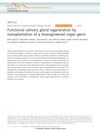Organ Regeneration Based on Developmental Biology: Past and Future
June 2018
in “
Current Opinion in Genetics & Development
”
organ regeneration stem cell developmental biology bioengineered organ germs organoids integumentary organ system hair follicles 3D culture system blood vessels hair follicle stem cells regenerative therapy alopecia pluripotent stem cells tissue stem cells hair loss hair follicle regeneration stem cell therapy hair loss treatment

TLDR Scientists have made progress in growing mini-organs and regenerating parts of the skin, with plans to treat hair loss in a future trial.
Over the past decade, there has been considerable progress in the field of organ regeneration, particularly through the integration of stem cell and developmental biology. This has led to the creation of bioengineered organ germs and the generation of mini-organs, or organoids, that mimic real organs. A significant accomplishment is the regeneration of the integumentary organ system, which includes hair follicles, showcasing the potential for regenerating functional 3D organ systems. However, challenges remain, such as developing a 3D culture system that can provide blood vessels for organoid growth. Hair follicle stem cells are at the forefront of regenerative therapy, with a clinical trial for hair follicle regeneration to treat alopecia planned for 2019 in Japan. This could pave the way for regenerating other organs using pluripotent and tissue stem cells. The document also mentions a conflict of interest, with partial funding from Organ Technologies Inc. and an author's affiliation with the company.








